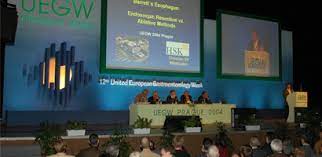The European Gastroenterology Congress (UEGW), which took place in Prague in 2004, was one of the largest events we had the opportunity to organize in 30 years. The main topic of the congress was cancer. Almost 10,000 participants attended the event. It was the largest congress of its time, which took place in Prague. The social evening took place in the Strahov and Břevnov monasteries and culminated in a reception at Prague Castle, where the program featured Revival E. Presley and the Beatles.
“The congress centre is characterized by several extremely valuable features. Its location at the metro station makes it easily accessible from most hotels, so it was possible to completely drop the shuttle service. The view through the glass walls from all floors is breathtaking. What was initially considered the biggest shortcoming turned out to be the real trump card. The congress centre lacks a hall suitable for a company exhibition, while the main exhibitors take the mammoth multi-storey expositions for granted. Here they had to be satisfied with smaller units, which had to be placed in the corridors and in all free spaces. In the end, this met with a very positive response, because the contact between the halls and the exhibitors was immediate – the stands were permanently besieged, their pleasant environment was relaxing on days full of professional programs, again with a large share of unique scenery.
The main events of the social program were placed in the truly spectacular scenery of the Strahov and Břevnov Monastery and in the Spanish Hall of Prague Castle. -Welcome- The reception at the exhibition centre was the first in the history of European congresses where the quality and quantity of food and drink were sufficient. Also in the program, the organizers did not try to impose any personal or local messages, but pragmatically bet on what will amuse the widest set of very heterogeneous societies. Revival E. Presley and the Beatles were received with enthusiasm because the culture of the sixties is extremely attractive to most of us.”
MUDr. doc. MUDr. Julius Spicak, CSc.

Copyright © 2023 – GUARANT International spol. s r.o.